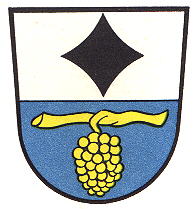Güls: Difference between revisions
Knorrepoes (talk | contribs) m (Text replacement - "{{media}} Literature : Stadler, 1964-1971, 8 volumes." to "Literature : Stadler, 1964-1971, 8 volumes. {{media}}") |
Knorrepoes (talk | contribs) m (Text replacement - "Literature :" to "'''Literature''':") |
||
| Line 28: | Line 28: | ||
[[Civic Heraldry Literature - Germany|Literature]] : Stadler, 1964-1971, 8 volumes. | [[Civic Heraldry Literature - Germany|'''Literature''']]: Stadler, 1964-1971, 8 volumes. | ||
{{media}} | {{media}} | ||
Revision as of 05:41, 9 September 2022
This page is part of the German heraldry portal Deutsche Wappensammlung |
Heraldry of the World |
|
German heraldry:
|
Selected collector's items from Germany:
|
GÜLS
State : Rheinland-Pfalz
District (Kreis) : until 1969 Koblenz
Incorporated into : 1969 Koblenz
| German | |
| English | No blazon/translation known. Please click here to send your (heraldic !) blazon or translation |
Origin/meaning
The arms were granted in 1938.
The arms show in the upper part a diamond derived from the arms of the (extinct) local noble family Von Güls.
The grape in the lower part symbolises the importance of viticulture in the area.
Güls belonged historically to the State of Trier, and the Bishops of Trier had given it in loan to the St. Servatius Abbey in Maastricht (now in the Netherlands). The oldest and only seal of the town dates from 1294 and shows the bust of a saint, holding a key. Both St. Peter, the patron saint of Trier, and St. Servatius use a key as their symbol. The key, nor the cross of the State of Trier was added to the arms, when the council applied for arms in the 1930s.
Literature: Stadler, 1964-1971, 8 volumes.
Contact and Support
Partners:
Your logo here ?
Contact us
© since 1995, Heraldry of the World, Ralf Hartemink 
Index of the site












